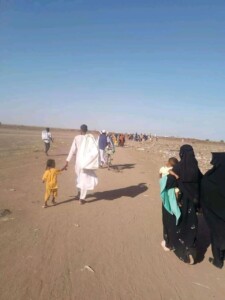Belgium to forcibly deport refugees in cooperation with Sudan
Belgian opposition groups, refugees, and human rights organisations led by Amnesty International have strongly criticised Brussels for having invited Sudanese government officials to identify migrants and arrange documents for their forced repatriation.
Belgian opposition groups, refugees, and human rights organisations led by Amnesty International have strongly criticised Brussels for having invited Sudanese government officials to identify migrants and arrange documents for their forced repatriation.
In an open letter, the organisations expressed their “extreme concern” about the decision of Brussels to involve Sudanese authorities in the identification of asylum seekers without papers. The cooperation could bring the Sudanese asylum seekers in serious problems, they said.
According to the British newspaper The Telegraph, the campaigners warned that the Sudanese identification team are likely to be secret police agents seeking political opponents and accused the Belgian government of collaboration with the regime.
Amnesty pointed to the dire human rights situation in Sudan, where the security apparatus has an iron grip on society, "There is a deeply rooted culture of impunity under the security services, which does not scare people torture and abuse civilians," the organisation stated.
In 2016, Amnesty investigated testimonies of Sudanese who declared that they were arrested, abused and tortured by Sudanese authorities after a forced return from Jordan.
"Given the situation in the country, it is inadmissible to send back Sudanese people from the conflict areas," Eva Berghmans, asylum expert from Amnesty International Flanders told the Belgian Knack magazine. “The Belgian government must carry out an individual and thorough analysis of each personal situation before returning people to Sudan.”
‘Screened’
Theo Francken, the Belgium’s Minister for Asylum and Migration defended his invitation to inspect about 100 migrants in Brussels. He said his country’s intelligence services had screened the three officials, who arrived in the Belgian capital on Monday, to make sure they were not secret agents.
“We are doing what many other European countries do with African countries. It is not exceptional to do this with Sudan,” Francken said.
Some reports claim that the refugees, many of whom were recently arrested in Brussels’ Maximilian Park where they were camping, were on their way to Britain. While some of that number could be illegal migrants, others could be genuine asylum seekers and refugees.
Leaders of the Belgium Socialist Party and the Green Party have criticised Minister Francken’s initiative as well and demanded an explanation for his decision to deport Sudanese migrants and refugees fin cooperation with the Khartoum regime.
'Revolting'
“It’s revolting to see Theo Francken work with the Sudanese government to send refugees back to that oppressive country,” Human Rights Watch’s Andrew Stroehlein told The Telegraph.
“Sudanese President Omar Al Bashir has been a fugitive from the International Criminal Court since 2009, wanted on charges of genocide, crimes against humanity, and war crimes. This is Belgium’s new partner?”
In an interview with the Belgium VRT NWS, a Sudanese migrant who was forcibly repatriated said that returnees are always questioned at Khartoum Airport by agents of the National Intelligence and Security Service (NISS).
“They ask your name, your tribe, where you lived in Sudan, your level of education, and your political affiliation. When we arrived, they held a most of the people of our group. Until now, I have not heard about their fate,” he said.
“Most of the Sudanese leave the country for purely political reasons,” he explained.
Sources: telegraph.co.uk, knack.be, vrt.be, amnesty.org, theguardian.com, dabangasudan.org











 and then
and then